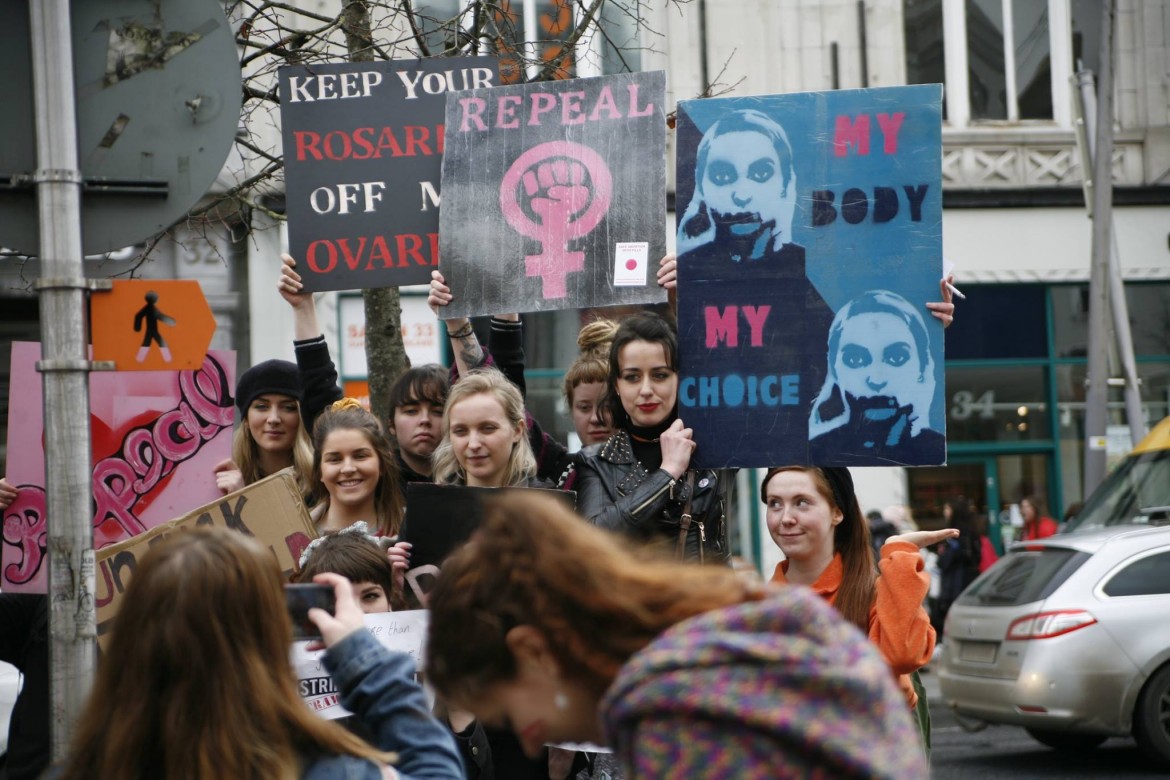Interview
Strike4Repeal fills Dublin streets to demand abortion law repeal
Il manifesto spoke with Avril Corroon, part of the strike in Ireland on Wednesday demanding women's rights. "What do we expect after 8 March? That the momentum is maintained."

A historic day for women’s rights in Ireland. Although Irish law on strikes is very restrictive, the social strike promoted by the “strike4repeal” campaign brought thousands of people across the country onto the streets to call for the government to hold a referendum on repealing the Eighth Amendment of the Constitution, which, on the grounds that the right to life of the unborn child is equal to that of the mother, makes abortion a fundamentally illegal act.
In an unusually sunny Dublin, hundreds of protestors dressed in black (the official color of the demonstration) picketed the main government buildings all morning, before heading towards O’Connell Bridge, the capital’s main bridge. Students from the various university campuses also gathered there and the bridge was blocked for a few hours, bringing the city to a standstill. The protestors chanted “Not the church, not the State, women must decide their fate” and “Enda, Enda, we want a referendum” (Enda Kenny is Ireland’s prime minister). A big march took place in the evening to end the day.
But it wasn’t just in the capital; demonstrations and picketing animated all of Ireland’s major cities. Today, the parliament will discuss a bill put forward by the opposition group People Before Profit to reduce the penalty for abortion to a symbolic fine of 1 euro, but the government has already announced a vote against it. Meanwhile, the decisions made by the “citizen assembly”, a group of 99 randomly selected citizens tasked with issuing recommendations for a potential legislative reform, are yet to be announced. We spoke about it with Avril Corroon, a spokesperson for the group that organized the strike.
Can you tell us about how your campaign for the strike on 8 March came about?
We formed after the Women’s Strike in Poland, while, in Ireland, the government were postponing their decision on the referendum for the umpteenth time, calling on the citizen assembly and increasing our frustration.
What will happen after 8 March? Surveys in relation to support for repealing the Eighth Amendment are not clear.
There are surveys commissioned by Amnesty International showing that 80 percent of people are in favor of repealing the Eighth Amendment. Other surveys seem to illustrate that a majority want to see a simple change. I think that this is down to unclear information, where some people believe that it’s acceptable to have laws in our Constitution that restrict people’s right to self-determine what they do with their bodies. If there was a possibility to hold a referendum, organizers would be able to show that the Eighth Amendment does not just need to be changed but repealed altogether. There is no room for compromise on this matter.
Do you expect to continue operating as “strike4repeal” even after today?
After 8 March, “strike4repeal” is bound to disband; we are a group that was created ad hoc to gather activists from different organizations, made up of ‘Mr Nobody’ but able to use its power to call a national social strike. We could come together in the future but, in any case, it’s clear that, since this campaign was launched, 48 local groups have been formed, there has been enormous mobilization and even people who were not active before are now involved. What do we expect after 8 March? That the momentum is maintained and that there will be opportunities for further strikes, called by even more people.
In recent years, in Ireland, there has been significant progress in civil rights, for example, the legalization of same-sex marriage. Why is there still no right to abortion?
The Irish government is scared and continue, in this cowardly way, to hand down the issue of reproductive rights to the next administrators, wasting time. The problem doesn’t concern middle-aged men in power, who demonstrate a blatant lack of political will to change the situation. This is exactly why direct action such as the social strike is necessary; we don’t have a choice and we won’t wait.
Originally published at https://ilmanifesto.it/strike4repeal-per-abrogare-il-divieto-allaborto-terapeutico/ on 2017-03-09
